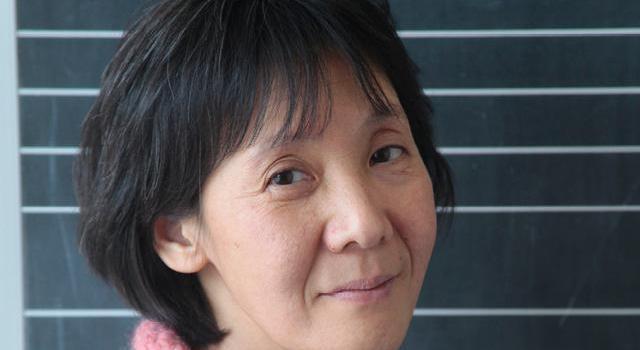Asian Studies
These include anthropology, Chinese language, economics, environmental studies, ethnography, film and photography, history, international relations, literature, music, politics, and religion studies. Geographically, Asian Studies at Hampshire encompasses China, Japan, Southeast Asia, South Asia, Tibet, and Asian American studies.
Asian Studies and Asian American Studies in the Five College Consortium allows Hampshire students to pursue a wide variety of courses in nearly all geographical areas of Asia and Asian America, including many Asian languages. Through Hampshire College and Five College courses, Hampshire students are able to develop an interdisciplinary Asian Studies concentration with both breadth and depth.
Through a recent grant from the Henry Luce Foundation, Hampshire College has particularly encouraged the study of Asia and the environment, creating links between Asian Studies and the natural sciences and the Hampshire Farm Center. Student work in these interdisciplinary areas is encouraged and supported with a variety of resources.
Using interdisciplinary courses and resources across the College, student projects have examined topics such as recycling in China, ecology of the Qinghai-Tibet Plateau, urban architecture and gay identity in China, gender and Asian American migration, Indian Buddhist philosophy, ethnic conflict in Malaysia, and entrepreneurship in Bhutan.
Student Project Titles
- Archeology of Queer: Identity. Space and the Becoming of the Chinese City
- Bioimaging of Trace Metal Distribution in Rice Seeds (Oryza sativa L.) from a mining area in Hunan, China using LA-ICP-MS
- Cardio-respiratory health and air pollution in urban China: a portrait in data-synthesis and watercolors
- Coming to Terms with the Nation: The Remaking of Hui Identity in Republican China
- Commodifying a Heavenly Past: Contemporary Post-Mao Chinese Religious Tourism
- Contextualizing Gender in Images from the Chinese Cultural Revolution
- Economic Development in South East Asia as it relates to the Mekong River
- Eihei Koroku: The Method & Meaning of Dogen's Lectures
- Environmental Governance in China
- Exploring Grassroots Recycling and Reuse in China
- Gendered Perspectives on Work, Development, and Migration: A Case Study of Female Burmese Migrants
- Incarnations of Selflessness: Interpretations of Anatmavada in Indian Buddhist Philosophy
- The "Land of Plenty": Nutrient Pollution and Eutrophication in China's Chao Lake
- Malaysia's Ethnic Conflict of May 13, 1969: A Study on Power-Sharing and Ethnic Conflict
- The Occupation of Japan: Literature and Film
- (Re)constructing New York City's Chinatown: A History of the Chinese Diaspora
- The Role of the Household Responsibility System in Chinese Agriculture: Continuity and Change
- Strangers in their own land: a critical analysis of media representation of Chinese migrant workers
- What Makes a Pureland? Ecology and Community on the Tibet-Qinghai Plateau
Sample First-Year Course
Asian Religious Texts and Traditions
The aim of this course is to introduce students to several of the oldest religious traditions of South and East Asia through a study of selected canonical texts. Part of our concern will naturally be to determine what these ancient records reveal to us about how people of these cultures understand, or once understood, such perennial human issues as the meaning of death, the nature of suffering, the value of human life, belief in God or the gods, and the possibility of liberation or life after death. But we will also consider such crucial historical and literary questions as, When were these texts produced and under what religious or cultural circumstances? Were these "texts" written and read, or chanted, performed, and heard? How were they produced or revealed, and by whom? Who had access to these traditions and in what form? What roles have these texts played in religious ritual, liturgy, storytelling, or popular culture?
Sample Courses at Hampshire
- Agriculture, Ecology, and Society
- Asian America and WWII
- Asian Spirituality in the West
- Buddhism and Environment
- Buddhist Economics
- China Rising
- Decoding Zen Buddhism
- Dekassegui, Karaoke, Saudade: Identity Politics of Nikkei Brazilians--the First 100 Years
- Dreaming East, Dreaming West
- Elementary Chinese, Intermediate Chinese (summer) and Third Year Chinese
- Immigration Nation: Ethnic Stereotypes, US Politics, and the Media
- Introduction to "Asia" through Music and Performing Arts
- Introduction to Modern Buddhism
- Japanese Popular Culture in the Transnational Context
- Kieslowski Meets Ozu
- Partition of India
- Past Performed: Creative Reconstructions of Oral History
- Photography in Asia
- Real and Fictive Identities: Ethnicity in Migrant Literature and Cinema
- State Power and Popular Protest in South Asia
- Sound, Image, and Narrative: A Multidimensional Approach to Japanese Culture
- Understanding 'Modern' South Asia: Society, Politics and the Colonial Inheritance
- US-China Geopolitics
- War, Resources, and Sustainability
Through the Consortium
- Asian/Pacific/American History: Themes and Issues, Historiography and History(UMass)
- Chinese Civilization (AC, SC)
- Chinese Foreign Policy (SC)
- Contemporary Chinese Fiction (MHC)
- Folktales and Legends of Vietnam (UMass)
- Intro to Indian Civilization (MHC)
- Intro to Modern East Asia (MHC, SC)
- Japanese I, II, and III (AC, MHC)
- Modern China (MHC)
- Modern Korean History (SC)
- Traditional Japanese Literature (AC)
Facilities and Resources
Center for East Asian Studies
The Five College Center for East Asian Studies is one of many programs administered by the Five Colleges. In addition to the center's concern with undergraduate East Asian studies at the five institutions, they aim to support, encourage, and improve the teaching of East Asian cultures in elementary, middle, and secondary schools, and two- and four-year colleges in New England.
They work to improve the quality, quantity, and distribution of resources for teaching about East Asia at the college and precollege levels and to offer opportunities for pre-college educators to experience East Asian cultures firsthand. The center maintains a resource library, publishes a newsletter three times a year, and conducts seminars, institutes, conferences, and workshops for college and pre-college educators.
Five College Certificate Programs
Two relevant Five College Certificate Programs are in Asian/Pacific/American Studies and Buddhist Studies, each overseen by a committee of faculty from all five institutions. The committees work to coordinate and expand course offerings at the five institutions, advise students seeking to fulfill program requirements in Asian/Pacific/American Studies or Buddhist Studies, and coordinates special events among the five institutions in collaboration with students from the five colleges.
East Asian Languages Program (EALP)
The Five College East Asian Languages Program (EALP) in Chinese, Japanese, and Korean brings together faculty members in East Asian languages to meet regularly throughout the academic year. Recently, they have organized and participated in workshops on the teaching and assessment of oral proficiency, the use of "authentic texts" in the classroom, and uses of web-based and other forms of computer-assisted instruction. The program also supports joint trips by faculty to professional conferences and outreach projects for pre-college instruction in East Asian languages.
Five College Tibetan Studies in India Program
Hampshire co-sponsors, with Smith College, the Five College Tibetan Studies in India Program. Through this unique program, students have the opportunity to study Buddhist philosophy, and Tibetan cultures and history during Smith's January Interterm at the Central University for Tibetan Studies in Sarnath, India.
Hampshire College China Exchange Program
Hampshire has a vibrant intensive Chinese language program taught in Hefei, China by our Chinese exchange partner, the College of Humanities and Social Sciences of Anhui Agricultural University. Students can study any level of Chinese language for one or two months in the early summer, equivalent to one or two semesters of study. Students may also elect to go to Anhui Agricultural University for a semester-long study, taking Chinese language and pursuing an independent study negotiated with the Hampshire faculty supervisor and faculty at AAU.
Through the same connection, two scholars, including a Chinese language teacher trained in teaching Chinese as a second language, reside on the Hampshire campus every year. In addition to teaching Chinese, they pursue their own research and education, auditing classes and utilizing our libraries.
During Smith's January Interterm, several undergraduate students from the Chinese university come to take courses and help tutor Hampshire students who are studying Chinese.



